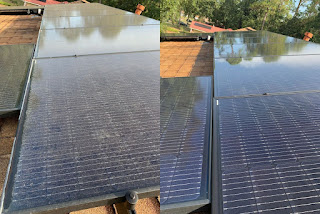Optimizing Solar Power Effectiveness for Energy Independence
Solar power has emerged as a cornerstone of sustainable energy solutions, offering a pathway to cleaner and more efficient electricity generation. As technology evolves and adoption increases, understanding the effectiveness of solar energy systems is essential for maximizing benefits and making informed decisions. In this blog, we explore the impact of solar power effectiveness for energy independence, environmental sustainability, and financial savings.
The Rise of Solar Energy-
Solar energy has witnessed exponential growth in recent years, driven by advancements in solar panel technology and favorable government incentives. This clean and renewable energy source has transformed the way we generate electricity, reducing dependence on fossil fuels and mitigating greenhouse gas emissions.
Advantages of Solar Power
Solar power effectiveness is evident in its numerous advantages:
1. Energy Independence: Solar power allows homeowners and businesses to generate their electricity, reducing reliance on traditional utility providers and fluctuating energy prices. By installing solar panels, individuals can produce clean energy right at their doorstep.
2. Environmental Benefits: The effectiveness of solar power in reducing environmental impact cannot be overstated. Solar panels generate electricity without emitting harmful greenhouse gasses, contributing to cleaner air and combating climate change.
3. Financial Savings: Investing in solar panels can lead to significant long-term savings on energy bills and provide a return on investment through net metering or solar incentives. Solar power's effectiveness in reducing utility costs makes it an attractive option for budget-conscious individuals and businesses.
Factors Impacting Solar Power Effectiveness
Several factors influence the effectiveness of solar power systems:
1. Sunlight Exposure: The amount of sunlight a location receives directly affects the efficiency of solar panels. Regions with abundant sunlight, such as the southwestern United States, are more conducive to solar energy production.
2. Panel Orientation and Tilt: Proper orientation and tilt of solar panels optimize sunlight absorption, maximizing energy generation throughout the day and across seasons. South-facing panels tilted at an optimal angle can capture the maximum amount of sunlight.
3. Quality of Solar Panels: The quality and efficiency of solar panels play a crucial role in solar power effectiveness. Higher-quality panels with better efficiency ratings and durability produce more electricity over their lifespan, maximizing return on investment.
The Future of Solar Power
As technology continues to advance and costs decline, the effectiveness of solar power will only continue to improve. Innovations in solar panel design, energy storage systems, and smart grid integration are paving the way for a more resilient and decentralized energy infrastructure.
Harness the Power of the Sun with Solar Power
Solar power effectiveness is evident in its transformative impact on energy sustainability and independence. Embracing solar energy not only benefits the environment but also empowers individuals and businesses to take control of their energy future. By optimizing solar power systems through proper design, installation, and maintenance, we can unlock the full potential of renewable energy and pave the way toward a cleaner, brighter future powered by the sun.
Join the renewable revolution today and discover the effectiveness of solar power in transforming our energy landscape!
.jpg)

Comments
Post a Comment